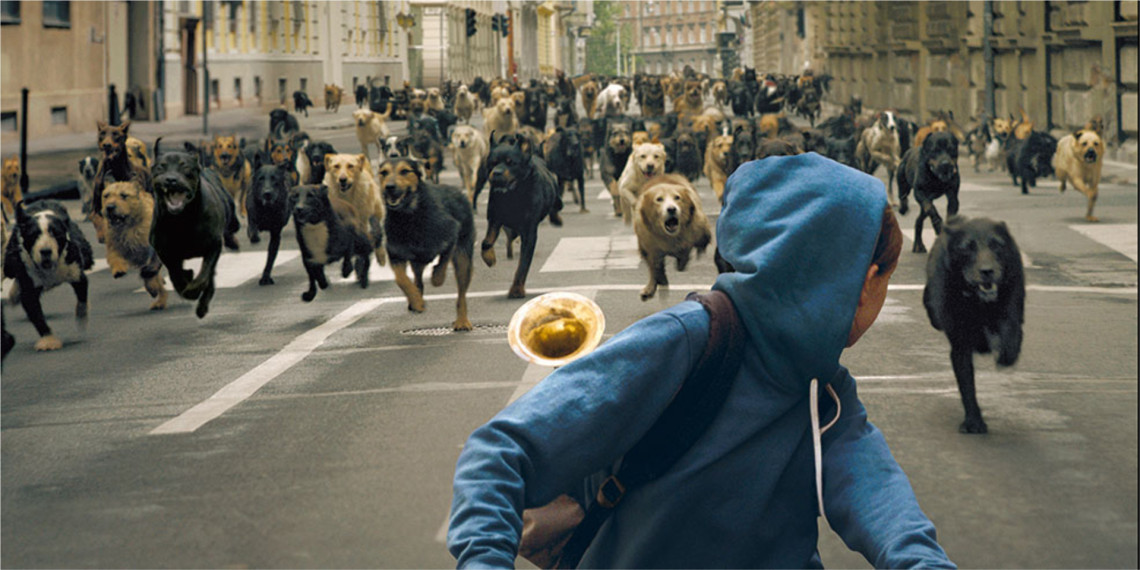Allegory has long been a handy tool for fiction writers making harshly critical or otherwise potentially inflammatory statements on delicate situations. Cloaking rhetoric in what is essentially an elaborate symbol can make complex commentary immediate and palatable, even as it runs the risk of oversimplifying an issue. Winner of the Un Certain Regard Award at last year’s Cannes Film Festival, Kornél Mundruczó’s White God boils the simmering class resentments of Hungary and Europe at large into its simplest components: The stray dogs of Budapest stand in for all who have been exploited on the whims of the bourgeoisie. But like George Orwell with Animal Farm before him, Mundruczó takes White God beyond a strict metaphor for the sociopolitical goings-on of a specific time and place, and makes universal statements about the terrible toll of power and the frustrations stemming from the lack thereof.
As allegories go, though, Mundruczó’s isn’t especially subtle. He prefers to go for the jugular with his vicious class critiques, sometimes to a shockingly literal end. White God takes place in a not-so-distant-future Budapest, where a new law designed to encourage refined dog breeding has levied a harsh tax on all mixed-breed mongrels. In the wake of her parents’ divorce, precocious Lili (Zsofia Psotta) is sent to live with her vaguely fascistic father (Sándor Szótér). The trouble’s with her companion: her beloved mutt Hagen, who attracts the attention of government officials soon after he arrives. Lili’s father has no intention of ponying up the “mongrel fee,” and decides to drop Hagen off at a random street intersection. It’s here that Mundruczó bisects his plot, with one half tracking Lili as she hunts down Hagen and deals with her demanding orchestra instructor. (Adult white men are bad news across the board in Mundruczó’s world.)
White God’s other half plays out like Air Buddies: Violent Proletarian Uprising. In what must surely be the runaway slave narrative with the most “awwww!”-worthy moments, Hagen roughs it on the mean streets of Budapest, enduring abuse at the hands of every human he encounters. White God then hangs a hard left turn when it repositions Hagen as the canine Che Guevara, leading his brothers-in-bondage in a revolution against the human overlords. After all, the dogs have nothing to lose but their collars.
This late-in-the-game tonal shift ends up being Mundruczó’s strongest and weakest move. That bit about the canine overthrow of the established power structure doesn’t even qualify as a spoiler, because Mundruzcó sticks it right at the outset in at attempt at an in medias res structure that takes a lot of the wind out of the scene’s sails the second time around. White God is not the sort of movie that needs to play its hand so early in the game, especially not when the true beginning could hook viewers just as well. (Within the first five minutes, Mundruczó treats viewers to the sight of a butcher teasing the skin off of a real cow carcass, then disemboweling the cow, thus making the human savagery unblinkingly apparent from scene one.) More troubling still, the scene’s second play takes on the visual profile of straight horror, a directorial mode with which Mundruczó does not appear comfortable. Dogs can be scary (just ask Stephen King), but in White God, the reacting humans do all the work, cowering in fear at attackers who look like they’re having the time of their doggy-dog lives.
At the same time, that opening set piece represents the culmination of Mundruczó’s powers as a mass coordinator. He adhered to a hard-and-fast code of eschewing CGI during production, successfully pulling off the Herculean labor of swaying dozens upon dozens of actual animals to follow his direction. Only the gods of cinema know how he did it, but Mundruczó coaxes a brilliant lead performance from Luke and Body, the two dogs that alternate as Hagen. With minimal musical cues to help him along, Mundruczó captures Hagen’s fear, anger, despair, and the battered hope beneath it all.
Allegory is all well and good, but after the lofty arguments have been made, a film must necessarily stand on its own merits. White God is a feat of practical filmmaking, and beyond that, a searing depiction of the cruelty and resilience of the living spirit—human or otherwise.





















One thought on ““White God””
Wow, how beautifully written! I absolutely adored the film, I found it very refreshing.